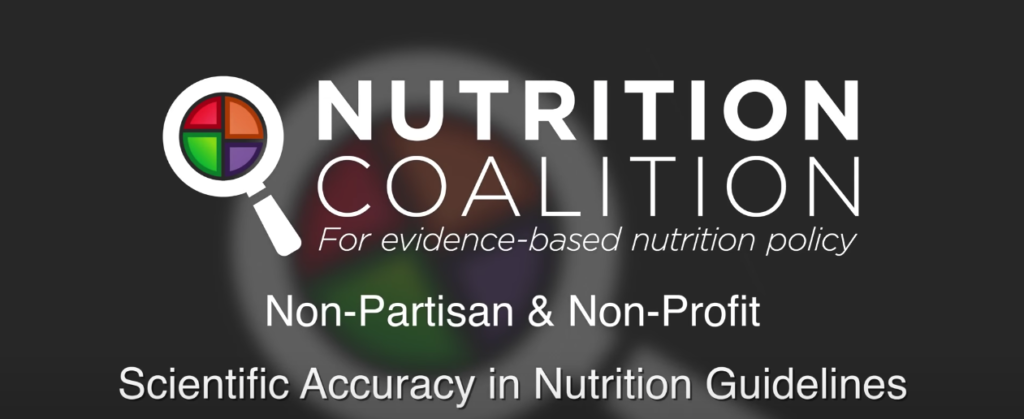The Nutrition Coalition, a group aiming to bring rigorous science to nutrition policy, released an open letter signed by 239 Ph.D.’s, doctors and other healthcare practitioners —representing a wide range of specialties, practicing in communities across the country— calling on the Secretaries of the U.S. Departments of Agriculture and Health and Human Services (USDA-HHS) to delay the expert report by the Dietary Guidelines Advisory Committee (DGAC), due out tomorrow, to ensure adequate time for a thorough investigation of allegations made by one or more members of the DGAC about the Dietary Guidelines for Americans (DGA) process.
The doctors’ letter comes after allegations by one or more member(s) of the DGAC blew the whistle, expressing extensive concerns about the Committee’s process, as detailed in a letter by the Nutrition Coalition.
The MD/Ph.D. letter urges USDA-HHS, which together oversee the Guidelines, to seriously consider the allegations made by this/these DGAC member(s) in order to ensure that the DGA is grounded in a rigorous scientific methodology and includes all relevant evidence on nutrition and chronic illness.
The open letter states: “It is not acceptable for the 2020 DGAC to ignore all studies on weight loss and all studies on low-carbohydrate diets. It is also not acceptable for scientific reviews to end in 2016 when it is now 2020. Most importantly, we think it imperative to publish Dietary Guidelines that address the needs of all Americans, including those with diet-related metabolic diseases.”

“There are now multiple voices calling for a delay in the DGAC expert report. These voices include medical and nutrition professionals, member(s) of the DGA Committee itself, and a Member of the Congress–all raising concerns about the Dietary Guidelines process. The allegations are serious and cannot be ignored. USDA-HHS should delay publication of tomorrow’s expert report to address and potentially remediate these issues.” stated Nina Teicholz, Executive Director of the Nutrition Coalition.
Other groups have expressed similar concerns. The Academy of Nutrition and Dietetics submitted public comments elaborating on concerns with the scientific process, including the lack of a transparent methodology and the problem of excluding evidence–and urged a delay in the publication of the DGAC report. In its letter, the Academy stated, “the critical work of developing, reviewing, and drawing conclusions from systematic reviews should not sacrifice quality for alacrity. Systematic reviews should not be developed with less-transparency or more limited engagement of experts than was previously used.”

The Low-Carb Action Network (L-CAN) also sent a letter focusing on the exclusion of virtually all low-carbohydrate clinical trials as well as nearly all studies on weight loss.
U.S. Representative Dusty Johnson (R-SD), Ranking Member of the House Agriculture subcommittee on Nutrition, Oversight, and Department Operations also sent a letter to USDA-HHS secretaries, echoing concerns about the exclusion of evidence and calling for a delay of the DGAC report.
In 2017, the National Academies of Science, Engineering, and Medicine (NASEM) completed a Congressionally-mandated review of the DGA process. NASEM’s two reports identified a series of recommendations that needed to be adopted to ensure the integrity of the Guidelines. However, in 2019, USDA responded that due to “time and resource constraints” it would not adopt many of the NASEM’s recommendations.
“With 60 percent of Americans diagnosed with one or more chronic illness, the guidelines have self-evidently been unable to flatten the curve on the rates of these diet-related diseases. Given that data across countries show that people with these diseases affected by Covid-19 have higher rates of hospitalizations and critical care, and with cases of the virus again on the rise in some communities, the need for nutrition policy that is effective and trustworthy is all the more important,” said Teicholz.
The DGAC expert report can be found here.
Also on Coast to Coast
-
Desert Harvest’s Newest Product: Providing Gentle Relief to the Body
-
A Cup A Day: Managing Diabetes One Beverage at a Time
-
Episode 27 of Coast to Coast: Checking out the Galleri Classic & Summer Travel Inspiration with Dalia Colón!
-
Coast to Coast Kicks Back at GBK Brand Bar’s Pre-Oscar Luxury Lounge
-
Coast to Coast Checks Out the Best of Sprouts with Nutritionist Cara Harbstreet
